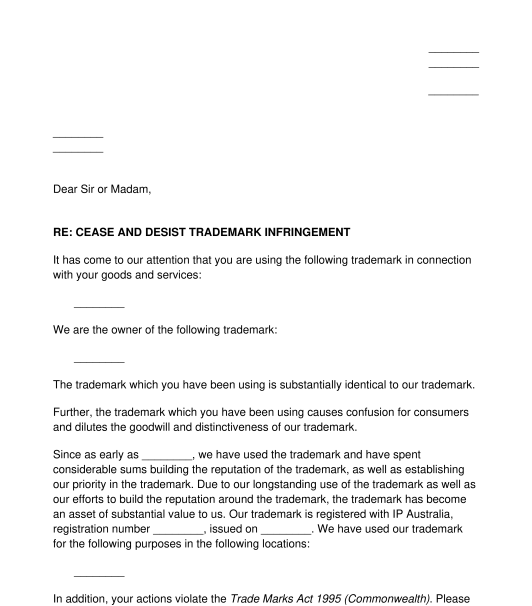 26/11/2025
26/11/2025

Answer a few questions and your document is created automatically.

Your document is ready! You will receive it in Word and PDF formats. You will be able to modify it.

 26/11/2025
26/11/2025
 Word and PDF
Word and PDF
 1 to 2 pages
1 to 2 pages
A Cease and Desist Letter is a letter sent to an individual or business that is engaging in unwelcome or illegal behaviour. The Cease and Desist acts as a formal request that the recipient stop ("cease") and not continue ("desist") this behaviour. If the recipient of the letter fails to comply with these demands, the sender should be prepared to take further legal action to stop the behaviour that is harming or interfering with the sender's rights and abilities to conduct business.
This Cease and Desist letter should be used in cases of trademark infringement. A trademark is a way of identifying a unique product or service - such as a 'brand', a logo, letter, number, phrase, word, sound, smell, shape, picture, movement, type of packaging, or some combination of these.
Another common form of intellectual property infringement is copyright infringement. Copyrights relate to creative works, such as pieces of writing, music or art work. This letter does not deal with copyright infringement. However, we have another Cease and Desist letter available for use in the case of copyright infringement - Copyright Infringement Cease and Desist Letter.
For other matters, use our General Cease and Desist Letter.
A Cease and Desist letter includes the following basic elements:
Once the letter has been completed, it should be sent by registered post to the individual or business that has been conducting the offensive behaviour.
There are no laws outlining what must be included in a Cease and Desist letter. However, best practices dictate that a Cease and Desist include a detailed description of the offending behaviour and a clear demand that the behaviour stop or else legal action will be taken.
If the matter ends up in court, a Cease and Desist letter can be used to show that the Defendant was put on notice about their offending behaviour, so the more detailed the letter, the better.
The Trade Marks Act 1995 (Commonwealth) may be relevant to this matter, in particular if the offending behaviour does not stop and further action becomes necessary. In addition, the Australian Consumer Law, which is contained in Schedule 2 of the Competition and Consumer Act 2010 (Commonwealth) may also be relevant if the offending person or business engages in misleading and deceptive conduct.
You fill out a form. The document is created before your eyes as you respond to the questions.
At the end, you receive it in Word and PDF formats. You can modify it and reuse it.
Guides to help you
Country: Australia